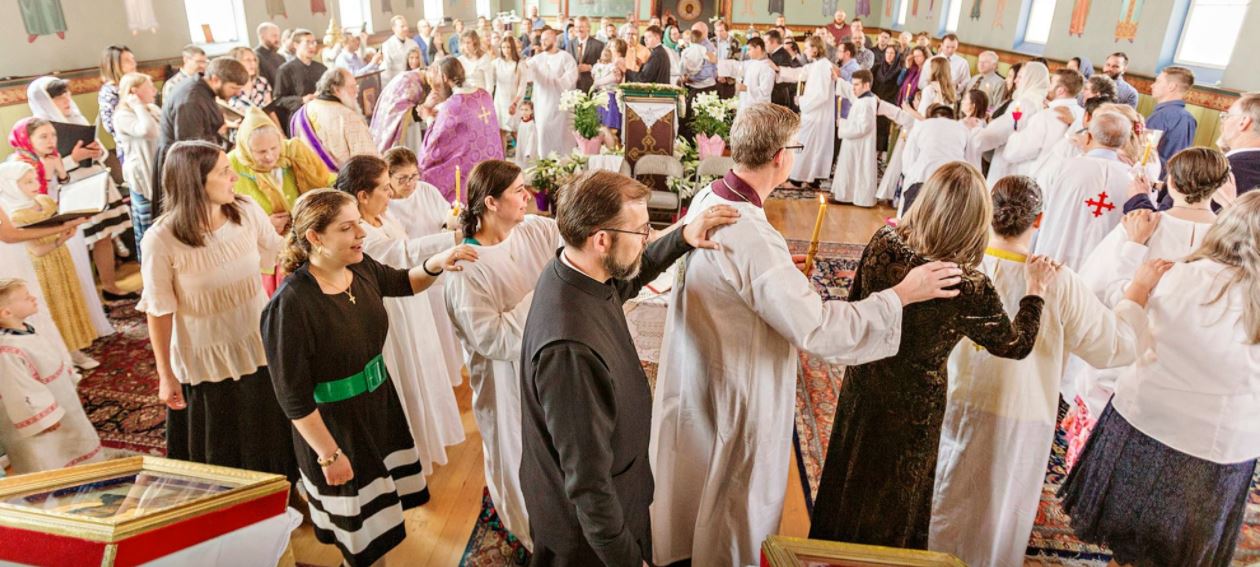
by Robert Mims
On Holy Saturday, 2018, my life-long search for the ancient Christian faith ended. My hair still damp from baptism, I donned my white robe, clutched a candle and queued up for my first Holy Communion.
I was one of more than 20 catechumens to receive the Eucharist, along with several newborn infants. But we were, all of us, newly born of the water and Spirit; a year of preparation and study and prayer and confession had led us to that point.
And, it was just the beginning of our journey – even for me, a 64-year-old “babe” with gray beard and thinning hair. How an Evangelical/Pentecostal preacher’s kid, long since grown cynical about faith, got to that moment is a story of God’s grace, providential timing, and I won’t deny it, even miraculous.
In April 2017, then a religion writer for Utah’s leading newspaper, I had heard that Saints Peter and Paul Orthodox Church was baptizing new converts by the dozens. Indeed, what made this a story was that this Antiochian fellowship of 250, located in a century-old downtown Salt Lake City building that had begun as a synagogue, was made up primarily of converts –many from the state’s predominant Mormon faith.
I vaguely knew Orthodoxy from the local Greek community and thought of it as some sort of offshoot of Roman Catholicism. My interview with Fr. Justin Havens, pastor of SPPOC, quickly corrected that thinking.
I also learned, as I sought out parishioners for their own stories, that while a good portion of Fr. Haven’s flock were former Latter-day Saints, many, too, had been Roman Catholics, Episcopalians, Lutherans, Presbyterians, Baptists, and other Protestant groups – including many from my own “charismatic” background.
The story I wrote was well received (https://bit.ly/2lUGbLY), and normally, that would have been it for me; on to the next assignment. But Fr. Justin’s patient answering of my questions, and the honest, open conversion experiences shared by Orthodox Christians I spoke with both at SPPOC and from other parishes, kindled a faith inside me I had thought long gone.
A few weeks later I began attending first Orthros (a.k.a. Matins), and then Divine Liturgy. Certainly, the novelty of the prayers, chants, singing, icons, candles and the incense wafting through the church were all new to me, and impressed me in their beauty, a worship that incorporated all the senses.
But the growing sense of homecoming, peace and the “rightness” of it all kept me coming back. My first Saturday evening Vespers moved me to tears, the subdued prayers in a nave lit only by candlelight more fully intimate spiritually than I had ever experienced before.
I say, “fully intimate,” because spiritual intimacy had been the focal point of my experience growing up in Pentecostal churches. Pentecostalism, as I knew it at least, was dependent on the emotional response; the Holy Spirit moved with the music of the worship band, sometimes “aided” by drums, electric guitars, strobe lights and smoke machines. People danced in the aisles on occasion; some spoke in tongues, and others would interpret – oddly enough, as I would learn over the years that left me skeptical — in paraphrased scripture, or grammatically lacking King James English.
What my upbringing did give me, however, was a precious gift: a love for Jesus Christ that remained strong, even as the Pentecostal “dogma” of my youth fell away. As I thought about what Fr. Justin had told me about his faith in that first interview, I wanted to know more.
I had been looking for Christianity as taught from its earliest sources, the apostles, informed by their own memories of the flesh-and-blood Son of God, and enlightened and empowered by the Holy Spirit at that first real, Book of Acts Pentecost.
And here it still was, as St. Athanasius wrote,
“what Christ taught, the apostles preached, and the Fathers kept.”
Here, too, was the scripture I had been taught since childhood was the Word of God, but not interpreted by whim to spawn thousands of competing denominations.
Instead, I learned how those very same Bible verses I had memorized as a child through a Pentecostal/Evangelical prism were so much more – the words of and about God, yes, but understood and applied through millennia of liturgical and doctrinal traditions; the teachings of holy men part of an unbroken apostolic succession, safeguarded from heresies by prayerful ecumenical councils; and still alive and thriving in saints departed, and living.
So many people sharing their conversion experiences on Journey to Orthodoxy have explained the errors of theological and doctrinal specifics from their past faith affiliations. I have come to realize some in my own past beliefs, too.
But I am eternally thankful for the loving introduction to Christ my parents gave me. I found saving grace in that upbringing; I discovered Grace, with a capital “G,” and the fullness of the living, breathing Body of Christ, in Orthodoxy.
Where I once dipped my toes in the tide lapping the shore along the ocean of Our Lord’s love, I have now begun to wade into the waves.
I only desire to go deeper.

Leave a Reply